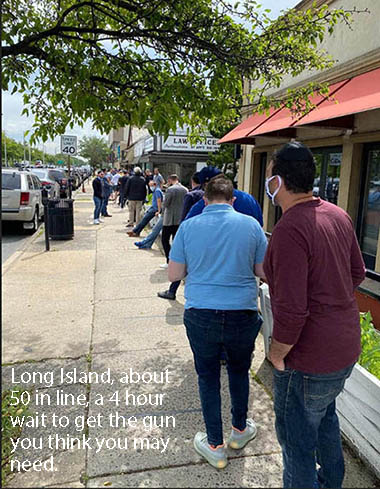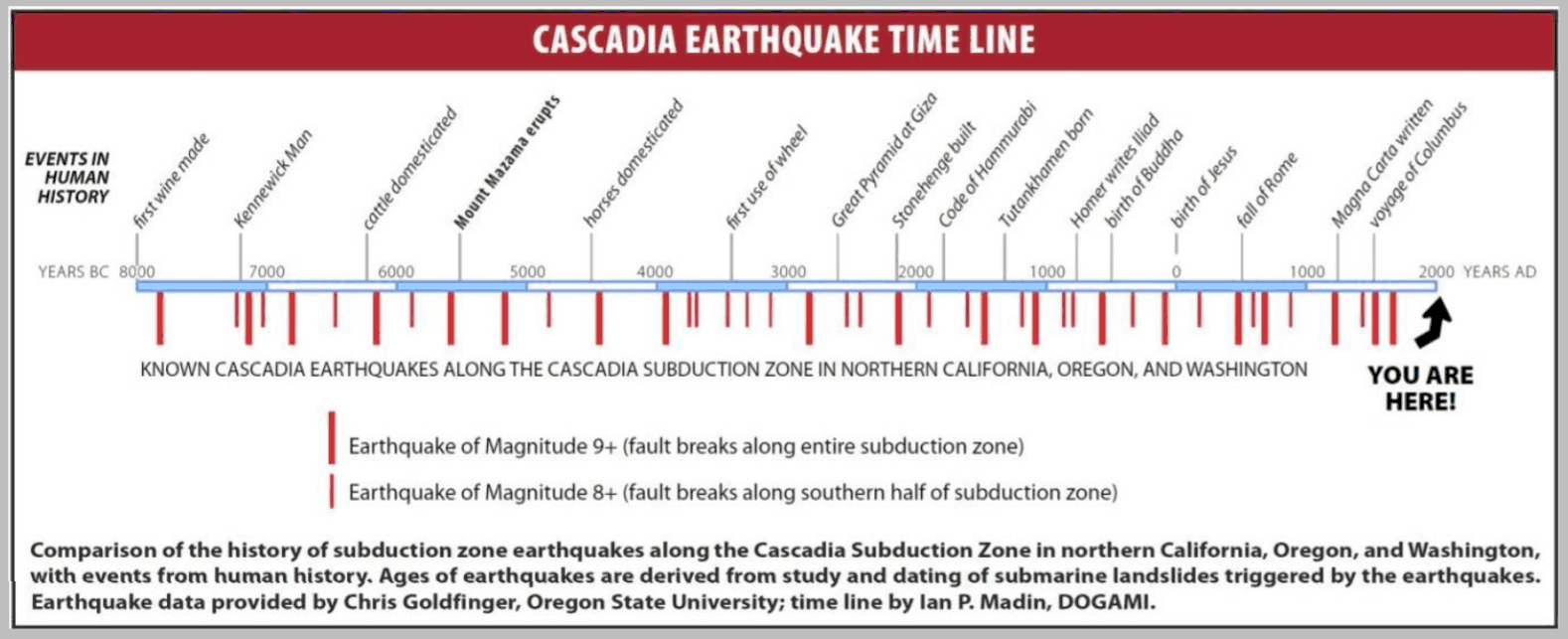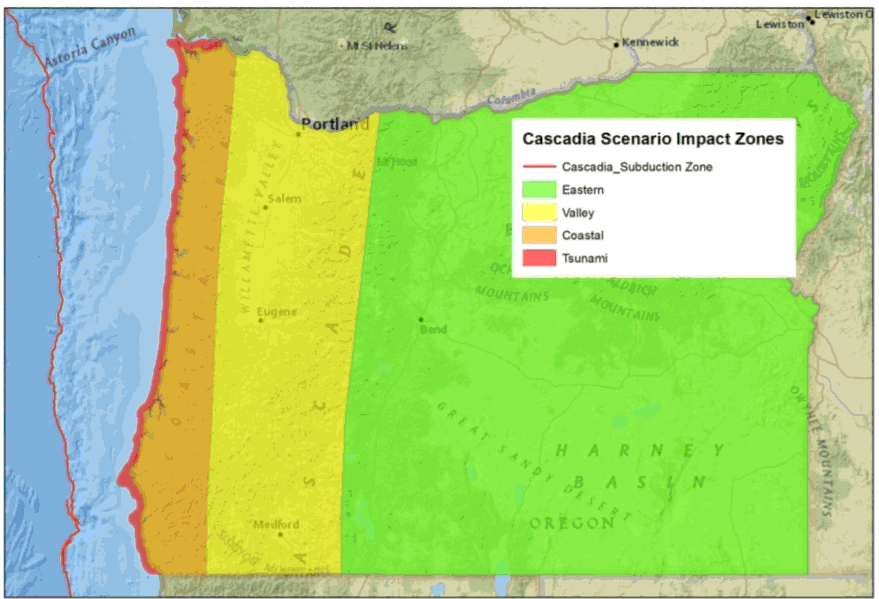
SATURDAY, JULY 4, 2020: NOTE TO FILE

The New EPA
Existential Protection Agency:
Non-governmental, non-profit, non-partisan
Eric Lee, A-SOCIATED PRESS
TOPICS: ORGANIZE, LIFE-DRIVEN PURPOSE, FROM THE WIRES, FORESEE OR DIE
Abstract: Communities may increasingly need to self-organize (depend less on government agency) to make things work. A common ground would be concern for the continued existence of a community and protecting it from any existential threats, present or foreseeable. Members may have different concerns, but having them sets them apart from those who pursue only short-term self interests. A viable community should develop a 500-year plan. What is a civilization but its communities?
COOS BAY (A-P) — Support and membership to be based on having existential concerns (for threats to a community's continued existence) that extend beyond, but do not exclude, personal self interest. The common ground would be real concerns and moving towards such real solutions as may actually work. Each EPA, e.g. the Empire EPA or Lakeside EPA, would focus on local concerns that would include environmental concerns and concerns for people and property. For example the planed LNG terminal in Coos Bay is a potential threat that tops some residents' list of concerns. Others may view the failure to develop the terminal as an existential threat to the local economy.
So there is a community EPA meet'n greet potluck. Larry and Bev are new to the area. I mention my concerns about the LNG terminal. I see Frank and mention he has different concerns, motion him over, and ask him to share his concerns that if the terminal isn't developed, the local economy will collapse. Different concerns are not an existential threat to me or my community. Failure to cooperate and communicate is. If the terminal project fails and Frank is distressed, I'll understand and just LISTEN if he expresses his concerns again. If it goes in I'll mention that I hope I'm wrong about everything, and he'll nod and say, 'Me too'. Members may be politically active to redress their concerns as special interest sub-groups, but doing so would not be an EPA level function such that all members would be expected to engage in or support concerns they do not share or 'solutions' they guess won't actually work.
A large area concern would be the foreseeable Cascadia earthquake and tsunami. Community and household preparedness would be protective, so coastal Oregon EPAs would include CERT members and work to increase preparedness for this and other concerns. Neighborhood watch concerns would be included and each EPA might include several neighborhood watch groups, as an EPA area would likely be larger than a neighborhood enclave but smaller than a small city or metro area. As new EPAs form, some sort of regional EPA would self-organize as each communicates and shares information with other EPAs.
Some members might view increasing racial tension as an existential threat and organize a sub-group to rapidly respond to any racist graffiti with some on the spot color matching to paint it over as a quasi vigilante group. Graffiti that goes away within hours is ineffective.
Increasing exploitation of an area by drug users and organized theft rings in a non-EPA area could result in the formation of one. Policing an area in cooperation of with the professionals may, at some point in some areas, require active surveillance by property owners/residents outside of residential neighborhood watch domains. For some technology to be implemented and monitored, a group may need to be large enough to likely include enough individuals able to develop and implement it, but no bigger than needed. So each EPA would seek to be in a Goldilocks zone in terms of size.
 An EPA would be organized (to address existential concerns) at the level of a small to medium sized business. Information would be key, but one organized by volunteers having an interest in community protection and ability to thrive long-term. Individuals with existential concerns due to nearby rioting may line up at a local gun store (per longtime Long Island resident, about the only ones who had guns were ex-police and military, while the liberal majority assumed they could alway just call the police, so that they don't need a gun was the consensus narrative, until things change). The concerned may no longer believe they can always just call the police or other government agency if they have a problem, but there is no thinking beyond personal short-term self interest. To be effective, all concerns, including those that may arise in the future, need a higher level of foresight planning and organization.
An EPA would be organized (to address existential concerns) at the level of a small to medium sized business. Information would be key, but one organized by volunteers having an interest in community protection and ability to thrive long-term. Individuals with existential concerns due to nearby rioting may line up at a local gun store (per longtime Long Island resident, about the only ones who had guns were ex-police and military, while the liberal majority assumed they could alway just call the police, so that they don't need a gun was the consensus narrative, until things change). The concerned may no longer believe they can always just call the police or other government agency if they have a problem, but there is no thinking beyond personal short-term self interest. To be effective, all concerns, including those that may arise in the future, need a higher level of foresight planning and organization.
A non-profit organization may cover costs. For example, a special interest sub-group of EPA nerds may select one affordable security system. An EPA could invest in an inventory to be sold at cost to residents with whatever technical assistance they require supplied by neighbors who have installed it. It would be in my best long-term interest to provide financial assistance to all who may live within sight of my property who may need it and help them get it set up. It would be possible to organize all making video recordings in an area to pool them, upload them to a cloud server, such that if there is a crime, knowing the approximate time and place would allow footage from multiple sources to be viewed by community volunteers for clues that may be of assistance to the police. This level of organization would cost mostly time and effort, but the pay-off, especially in some areas, may be what prevents the loss of the community as increasing numbers of those able to function as community members feel forced to move out.
People who are just looking out for number one, even if not predatory, have no existential concerns for a community or posterity and so are part of the existential threat. They would not support or be members of an EPA. They are part of the problem and not any real solutions. Those having existential concerns, that are not merely belief-based (e.g. you are deeply concerned that the chief of police and the mayor are shape-shifting reptoid overlords working to establish the New World Order, but have no evidence yet), for a community are assets regardless of whether everyone shares their concerns or supports their proposed solutions. But communicating and cooperating with all having concerns is the meta-solution without which there is no community, and so in time it will falter and fail, becoming an abandoned zone and future archaeological site. The belief that all real solutions come from a government agency (or barrel of a gun) is questionable.
For the purposes of an EPA, there are two types of people: those who can't think beyond the next payoff (drug deal, thief, paycheck, or next quarter's returns) and those who can think more than ten years ahead and are not posterity blind. The self-interested short-termers will not support or want to be part of an EPA. Otherwise, having concerns for posterity and working to address existential concerns is the common ground for future-interested long-termers, the basis for organizing an EPA.
I would not expect or want any government at any level to do this level of surveillance or data gathering, but if those with access to the feeds access them only as needed and at significant time and effort on their part in response to a need to know, and then share information with local police, then the state of being policed will be improved. Some volunteers have access to footage from many cams and there would be a history of their viewing of it, so misuse could be detected and yes, someone needs to watch the watchers. Video feeds would be stored for 60 days before being permanantly deleted.
Some level of AI and facial/activity recognition may help. Two guys with flashlights pull up and take stuff from a truck into a place, not a red flag, but filling the truck repeatedly through the night might be, and AI could assess 'putting'
from 'taking' stuff. But local information from private video cams should stay local and shared or not with police per local control of those, among others, caught in the act of doing what they do. Having information may become key to protecting people and property, but like all technology is double edged and be misused. If someone is likely having an affair, that's not an existential threat to the community. Use of facial recognition would help the AI exclude known residents from being red flagged.
Presently communities are dependent on trucks supplying local markets (on average each bite on the end of an American's fork traveled 1,500 miles to get there) and their residents depend on money or gifts to buy stuff after walking the aisles. Posterity may depend on the environmental productivity of the area as 99 percent of their ancestors did, and on its proper management. Protecting the environment would then be primary. As the old EPA is defunded and depowered to keep growing the economy (for a time), it's endeavors will be passed on to those of the new EPA.
7/13/20: Something much like the above proposed surveillance has been done in San Francisco. Communities 'get the safety of a surveillance state without the state...'. And they get the potential for abuse of the technology. Better to have hundreds of thousands of EPAs with some failures than the USA or China et al. doing the surveillance and one failure. A few local busybodies snooping into matters they have no business knowing could be a bigger problem, but they are less an existential threat than a city, state, or nation-state/corporation (who are ultimately only concerned about 'crimes' against them) going bad or doing evil. I can have a talking to with a busybody (and would monitor video surveillance for snooping), but a city-hall or nation-state may think they are too big to be wrong.
All citizen viewing of the surveillance footage would be monitored by other citizen watchers who watch the watchers to prevent abuse. If there is a failure to use the surveillance appropriately, it would be a local failure that would need corrected and not a state-wide failure. If every community of a few thousand people in China or the USA had a community surveillance system, there would be cases of abuse, but the potential benefit could be vastly greater and vastly less risky than 'the government' doing the surveillance.
Different places have different existential threats. In the Pacific Northwest life post-Cascadia should be of existential concern:

Figure a 7-15% chance of a Big-one in the next 50 years.
In the tsunami zone, more will die by failure to reach high ground than by the earthquake.
A 9+ happens about every 525 years and is 10 x more destructive than an 8+ which happens about every 450 years.
An 8-9+ earthquake/tsunami happens about every 240 years and it's been 320 years since an 8+ earthquake.
In the coastal zone expect electric, fire, and police service to be restored in three to six months.
One to three years to restore drinking water and sewer service in the coastal zone.
Three years or more to restore healthcare facilities in the coastal zone.
In the tsunami zone the destruction will be much worse.

The Cascadia is one existential threat to forsee and prepare for.
